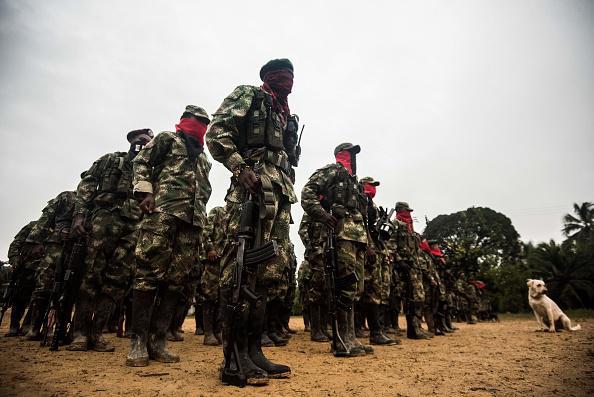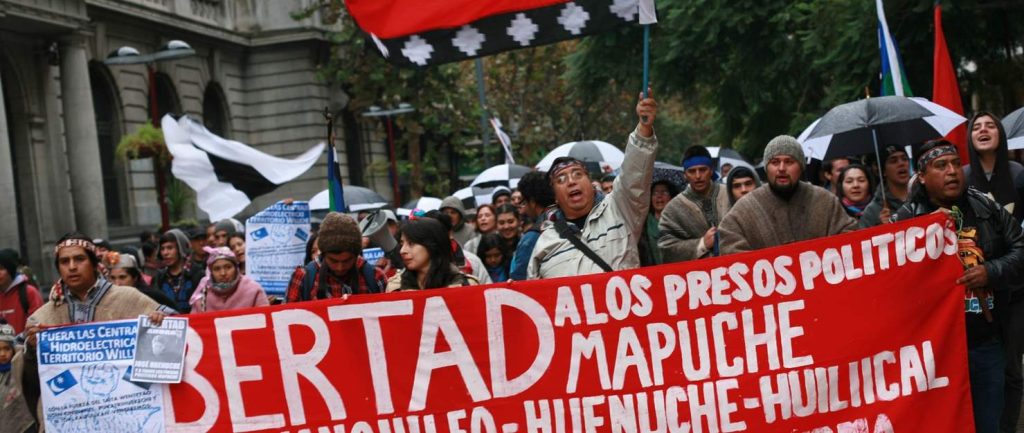This month, we update you on developments in Colombia, Brazil, Venezuela, Argentina, Ecuador and Chile. In Colombia, enforced coca eradication threatens the livelihoods of rural communities while armed opposition groups are using repressive measures to enforce COVID-19 curfews in the areas that they control. In Brazil, there is an increase in land seizures for illegal cattle ranching, Amnesty has called for an end to secret and illegal investigations against government opponents, and COVID-19 is out of control. In Venezuela, opposition members continue to be subjected to government threats and attacks, while the UN has highlighted impunity for gross human rights violations and a government failure to investigate crimes linked to the mining industry. In Ecuador, Amnesty has called for an urgent action plan to protect indigenous communities from COVID-19. In Chile, Amnesty has expressed concern for 27 detained Mapuche people who are on hunger strike. We have two Urgent Actions for you, relating to a Human Rights Defender in Colombia and a missing person in Argentina.
COLOMBIA

ELN Guerrillas in Chocó, Colombia
Amnesty International has issued an Urgent Action on behalf of the Human Rights Defender Jani Silva, who has received death threats from an armed group called “La Mafia”. They oppose the voluntary crops substitution programme that Jani Silva is promoting in the Putumayo region of Colombia. According to NGOs, “La Mafia” is behind the killings of 14 persons in the Putumayo region since the COVID-19 lockdown started. We are urging the National Protection Unit to increase the protection measures for Jani Silva.
Amnesty International has said that ‘The decision of Colombia’s Ministry of Defence to begin ground-spraying operations in coca plantations in some areas of the country could result in human rights violations in the campesino farming communities that depend on coca for their livelihoods. Moreover, beginning a process of forced eradication of crops could exacerbate the conflict in the country, leaving rural communities in an even more dangerous situation, particularly for social leaders. Operations to forcibly eradicate coca crops in the context of the COVID-19 pandemic are a death sentence for rural communities. Spraying illicit crops not only means depriving rural communities of their only livelihood amid the pandemic, but it could also destroy legal crops, an important source of food. In addition, these operations expose a population with limited access to health services to contagion.’
In a new report, Human Rights Watch found that in 11 of the country’s 32 departments armed groups have imposed curfews, lockdowns, and other measures to prevent the spread of Covid-19. To enforce their rules, the groups have threatened, killed and attacked people they perceive are failing to comply. ‘Armed groups imposing measures to prevent the spread of Covid-19 include the National Liberation Army (ELN) guerrillas; the Popular Liberation Army (EPL); the Gaitanist Self-Defences of Colombia (AGC); and several groups that emerged from the 2016 demobilization of the Revolutionary Armed Forces of Colombia (FARC) guerrillas, often called “FARC dissident groups”. Human Rights Watch has also documented that Contadores in Nariño and La Mafia in Putumayo have imposed Covid-19 measures.
Colombia has reported 267,000 cases of Covid-19 and 9,000 deaths and new cases and deaths are increasing at an alarming rate. The refusal of the government to lockdown Bogotá, as requested by its mayor, has resulted in the city’s ICUs being overwhelmed by Covid-19 patients, according to Colombia Reports.
The Internal Displacing Monitoring Centre states that 18 July a massacre in Tibú, in Norte de Santander, perpetrated by an organised armed group left 8 people dead and caused the displacement of 450 people from the area.
BRAZIL
In a new report, Amnesty International found that in Brazil’s Amazon, land seizures for illegal commercial cattle ranching are increasing at the expense of the rights of Indigenous peoples and traditional residents of Reserves. These land seizures threaten their land and their future. Indigenous peoples and residents of Reserves cannot access occupied areas, reducing their opportunities to hunt or collect natural resources. The land seizures are often accompanied by threats and intimidation against those living on and seeking to defend their territories. Indigenous peoples and traditional residents of Reserves often fear being hurt or killed if they go to these areas. In the worst case, they are compelled to flee their homes.
Amnesty International calls for an end to secret and illegal investigations against government opponents, such as the one recently reported on 579 federal and state public security officials and university professors critical of the government. Such investigations include a dossier containing the names, photographs and social media addresses of these people.
According to press reports, the President of the Republic Jair Bolsonaro and the Minister of Justice, André Mendonça, are responsible for this measure, which includes among the monitored people, Paulo Sergio Pinheiro, former national secretary of human rights and current UN rapporteur on human rights in Syria; Luiz Eduardo Soares, political scientist and adviser to Amnesty International Brazil and Ricardo Balestreri, state secretary of Articulation of Citizenship of the government of Pará and former president of Amnesty International Brazil.
The collection of data and the compilation of personal information against human rights activists and political opponents under the argument of “prevention, neutralization and repression of criminal acts” because of their political positions violates freedom of expression, including political opinion. This inalienable right of every person is provided for in the Federal Constitution of 1988 and in the international human rights treaties ratified by Brazil.
COVID-19 is out of control in Brazil, which reports 2.5 million cases and 90,000 deaths. These numbers are believed to understate the true extent of the pandemic.
More than 15,500 Indigenous Brazilians have been diagnosed with COVID-19, including at least 10,889 living in protected territories, according to Instituto Socioambiental, an Indigenous rights organization. At least 523 have died. A New York Times investigation found that the vectors of the disease may have been the health workers charged by the federal government with protecting the country’s Indigenous populations. More than 1,000 workers with the federal Indigenous health service, known as Sesai, have tested positive for the virus as of early July, a freedom of information request and interviews with union representatives found.
VENEZUELA
Venezuelan National Assembly opposition members, as well as their families and staff, continue to be subjected to threats and attacks from the government. During the COVID-19-related state of emergency, attacks against political dissidents have not stopped. After more than six months of continued threats, Amnesty no longer consider an Urgent Action to be the most effective tool to diminish these risks. It will continue to monitor the cases of arbitrary detainees such as Juan Requesens, Gilber Caro, and Renzo Prieto and react to new developments.
According to a new report from the Office of the United Nations High Commissioner for Human Rights (UNHCHR), the Venezuelan authorities have failed to investigate crimes linked to the mining industry, in the region of Arco Minero del Orinoco, including extortion, amputation and miners being buried alive. This is despite the “considerable” presence of the Venezuelan military. The report also provides an update on investigations into grave rights violations including extra-judicial killings and repression during protests against the Government of Nicolas Maduro.
During a dialogue with the UNHCHR at the Human Rights Council on 15 July, Amnesty delivered an oral statement calling on the Council to continue to scrutinise impunity for gross human rights violations in the country.
Human Rights Watch has called on the United Nations leadership and member states to press the Nicolás Maduro government to enable UN humanitarian agencies to do everything in their power to prevent a further spread of Covid-19 across Venezuela.
ARGENTINA
Amnesty International has issued an Urgent Action on behalf of Facundo Astudillo Castro who went missing on 30 April 2020. Police arrested him in Mayor Buratovich in the Province of Buenos Aires for violating the COVID-19 quarantine imposed at the national level. Contradicting police accounts, testimonies lead to a presumption of responsibility by the police officers involved. Facundo is still missing. We demand authorities determine Facundo’s whereabouts, ensure an independent, effective and impartial investigation on the case making the results public, and to bring those responsible for his disappearance to justice.
ECUADOR
On 1 July, the Confederation of Indigenous Nationalities of the Ecuadorian Amazon (CONFENIAE) reported 1,215 confirmed (45% of 2,673 people tested) and 622 suspected cases of COVID-19 in Indigenous Amazonian communities. They face a higher risk situation due to scarcity of drinking water, food sources, medical supplies, health services and COVID-19 tests. Amnesty have called for the urgent implementation of an action plan to protect them and guarantee their human rights.
CHILE

In an open letter to the Chilean president expressing concern about the situation of 27 detained Mapuche people who are on hunger strike, Amnesty has called on the government to establish dialogue with the prisoners and guarantee their rights to life and health.
All the best,
South America Team – Richard Crosfield (Colombia, Argentina, Brazil) and Graham Minter (rest of South America).